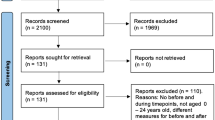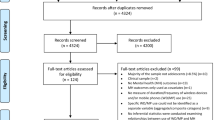Abstract
Purpose
Epilepsy in childhood extends far beyond seizures and affects child and parental well-being. The long-term impact of childhood-onset epilepsy on parental well-being is unknown. This study assessed health-related quality of life (HRQOL) in mothers 10 years after their child’s diagnosis of epilepsy.
Methods
Data come from the Health-Related Quality of Life in Children with Epilepsy Study, a multicenter prospective cohort study of children with newly diagnosed epilepsy. Mothers completed a mailed questionnaire at the 10-year follow-up, which included the Short-Form Health Survey (SF-12-v2) to evaluate the physical and mental health components of their HRQOL. Block-wise linear regressions identified child/epilepsy, maternal/family, and maternal psychosocial factors associated with mothers’ HRQOL.
Results
A total of 159 mothers participated in this study (46% of the sample assessed at baseline). At follow-up, 69% of youth had been seizure free for the past 5 years. Mothers scored similarly to population norms (mean: 50, SD: 10) on the mental health subscale (mean: 49.5, SD: 9.3) and significantly better on the physical health subscale (mean: 53.0, SD: 7.6). Better family resources were associated with higher (better) scores on the physical health subscale (B = 0.20; 95% CI 0.03, 0.36). Better family functioning (B = 0.34; 95% CI 0.06, 0.62), fewer maternal depressive symptoms (B = 0.33; 95% CI 0.20, 0.47), and perception of less stress (B = 0.70; 95% CI 0.52, 0.88) were associated with higher (better) scores on the mental health subscale.
Conclusion
Ten years after the diagnosis of epilepsy in children, the HRQOL of mothers was similar to reports from women in the general population. This study identified factors contributing to better maternal HRQOL and highlights the importance of family environment over epilepsy-related variables.
Similar content being viewed by others
References
Sillanpää, M., & Schmidt, D. (2017). Long-term outcome of medically treated epilepsy. Seizure, 44, 211–216.
Sillanpaa, M., Besag, F., Aldenkamp, A., Caplan, R., Dunn, D. W., & Gobbi, G. (2016). Psychiatric and behavioural disorders in children with epilepsy (ILAE Task Force Report): Epidemiology of psychiatric/behavioural disorder in children with epilepsy. Epileptic Disorders, 18(Suppl. 1), S2–S7.
Dunn, D. W., Besag, F., Caplan, R., Aldenkamp, A., Gobbi, G., & Sillanpaa, M. (2016). Psychiatric and behavioural disorders in children with epilepsy (ILAE Task Force Report): Anxiety, depression and childhood epilepsy. Epileptic Disorders, 18(suppl. 1), S24–S30.
Camfield, P. R., & Camfield, C. S. (2014). What happens to children with epilepsy when they become adults? Some facts and opinions. Pediatric Neurology, 51, 17–23.
Sillanpaa, M., Haataja, L., & Shinnar, S. (2004). Perceived impact of childhood-onset epilepsy on quality of life as an adult. Epilepsia, 45, 971–977.
Baca, C. B., Vickrey, B. G., Caplan, R., Vassar, S. D., & Berg, A. T. (2011). Psychiatric and medical comorbidity and quality of life outcomes in childhood-onset epilepsy. Pediatrics, 128, e1532–e1543.
Speechley, K. N., Ferro, M. A., Camfield, C. S., Huang, W., Levin, S. D., Smith, M. L., et al. (2012). Quality of life in children with new-onset epilepsy: A 2-year prospective cohort study. Neurology, 79, 1548–1555.
Rodenburg, R., Meijer, A. M., Dekovic, M., & Aldenkamp, A. P. (2005). Family factors and psychopathology in children with epilepsy: A literature review. Epilepsy & Behavior, 6, 488–503.
Puka, K., Widjaja, E., & Smith, M. L. (2017). The influence of patient, caregiver, and family factors on symptoms of anxiety and depression in children and adolescents with intractable epilepsy. Epilepsy & Behavior, 67, 45–50.
Ferro, M. A., & Speechley, K. N. (2009). Depressive symptoms among mothers of children with epilepsy: A review of prevalence, associated factors, and impact on children. Epilepsia, 50, 2344–2354.
Jones, C., & Reilly, C. (2016). Parental anxiety in childhood epilepsy: A systematic review. Epilepsia, 57, 529–537.
Austin, J. K., & Caplan, R. (2007). Behavioral and psychiatric comorbidities in pediatric epilepsy: Toward an integrative model. Epilepsia, 48, 1639–1651.
Lv, R., Wu, L., Jin, L., Lu, Q., Wang, M., Qu, Y., et al. (2009). Depression, anxiety and quality of life in parents of children with epilepsy. Acta Neurologica Scandinavica, 120, 335–341.
Bompori, E., Niakas, D., Nakou, I., Siamopoulou-Mavridou, A., & Tzoufi, M. S. (2014). Comparative study of the health-related quality of life of children with epilepsy and their parents. Epilepsy & Behavior, 41, 11–17.
Reilly, C., Taft, C., Nelander, M., Malmgren, K., & Olsson, I. (2015). Health-related quality of life and emotional well-being in parents of children with epilepsy referred for presurgical evaluation in Sweden. Epilepsy & Behavior, 53, 10–14.
Mori, Y., Downs, J., Wong, K., Anderson, B., Epstein, A., & Leonard, H. (2017). Impacts of caring for a child with the CDKL5 disorder on parental wellbeing and family quality of life. Orphanet Journal of Rare Diseases 12, 16.
Gallop, K., Wild, D., Verdian, L., Kerr, M., Jacoby, A., Baker, G., et al. (2010). Lennox-Gastaut syndrome (LGS): Development of conceptual models of health-related quality of life (HRQL) for caregivers and children. Seizure, 19, 23–30.
Moreira, H., Carona, C., Silva, N., Frontini, R., Bullinger, M., & Canavarro, M. C. (2013). Psychological and quality of life outcomes in pediatric populations: A parent-child perspective. Journal of Pediatrics, 163, 1471–1478.
Ware, J. E., Kosinski, M., Turner-Bowker, D. M., & Gandek, B. (2002). User’s manual for the SF-12v2® health survey (with a supplement documenting SF-12® health survey). Lincoln, RI: QualityMetric Incorporated.
Speechley, K. N., Sang, X., Levin, S., Zou, G. Y., Eliasziw, M., Smith, M. L., et al. (2008). Assessing severity of epilepsy in children: preliminary evidence of validity and reliability of a single-item scale. Epilepsy & Behavior, 13, 337–342.
Chan, C. J., Zou, G., Wiebe, S., & Speechley, K. N. (2015). Global assessment of the severity of epilepsy (GASE) Scale in children: Validity, reliability, responsiveness. Epilepsia, 56, 1950–1956.
McCubbin, H. I., Thompson, A. I., & McCubbin, M. A. (Eds.). (1996). FIRM: Family inventory of resources for management. In Family assessment: Resiliency, coping and adaptation. Inventories for research and practice. Madison, WI: University of Wisconsin Publishers.
McCubbin, H. I., Thompson, A. I., & McCubbin, M. A. (Eds.). (1996). FILE: Family inventory of life events and changes. In Family assessment: Resiliency, coping and adaptation. Inventories for research and practice. Madison, WI: University of Wisconsin Publishers.
Smilkstein, G., Ashworth, C., & Montano, D. (1982). Validity and reliability of the family APGAR as a test of family function. Journal of Family Practice, 15, 303–311.
Radloff, L. E. (1977). The CES-D Scale: A self-report depression scale for research in the general population. Applied Psychological Measurement, 1, 385–401.
Cohen, S., & Williamson, G. (1988). Perceived stress in a probability sample of the United States. In S. Spacapan & S. Oskamp (Eds.), The social psychology of health. Newbury Park, CA: Sage.
Maldonado, G., & Greenland, S. (1993). Simulation study of confounder-selection strategies. American Journal of Epidemiology, 138, 923–936.
Schwartz, C. E., Bode, R., Repucci, N., Becker, J., Sprangers, M. A., & Fayers, P. M. (2006). The clinical significance of adaptation to changing health: A meta-analysis of response shift. Quality of Life Research, 15, 1533–1550.
Hamama-Raz, Y., & Hamama, L. (2015). Quality of life among parents of children with epilepsy: A preliminary research study. Epilepsy & Behavior, 45, 271–276.
Mendes, T. P., Crespo, C. A., & Austin, J. K. (2017). Family cohesion, stigma, and quality of life in dyads of children with epilepsy and their parents. Journal of Pediatric Psychology, 42, 689–699.
Carona, C., Silva, N., Crespo, C., & Canavarro, M. C. (2014). Caregiving burden and parent-child quality of life outcomes in neurodevelopmental conditions: The mediating role of behavioral disengagement. Journal of Clinical Psychology in Medical Settings, 21, 320–328.
Rodenburg, R., Meijer, A. M., Dekovic, M., & Aldenkamp, A. P. (2007). Parents of children with enduring epilepsy: Predictors of parenting stress and parenting. Epilepsy & Behavior, 11, 197–207.
Raina, P., O’Donnell, M., Rosenbaum, P., Brehaut, J., Walter, S. D., Russell, D., et al. (2005). The health and well-being of caregivers of children with cerebral palsy. Pediatrics, 115, e626–e636.
Cousino, M. K., & Hazen, R. A. (2013). Parenting stress among caregivers of children with chronic illness: A systematic review. Journal of Pediatric Psychology, 38, 809–828.
Shore, C. P., Buelow, J. M., Austin, J. K., & Johnson, C. S. (2009). Continuing psychosocial care needs in children with new-onset epilepsy and their parents. Journal of Neuroscience Nursing, 41, 244–250.
Aytch, L. S., Hammond, R., & White, C. (2001). Seizures in infants and young children: an exploratory study of family experiences and needs for information and support. Journal of Neuroscience Nursing, 33, 278–285.
McNelis, A. M., Buelow, J., Myers, J., & Johnson, E. A. (2007). Concerns and needs of children with epilepsy and their parents. Clinical Nurse Specialist, 21, 195–202.
Shields, L., Pratt, J., & Hunter, J. (2006). Family centred care: A review of qualitative studies. Journal of Clinical Nursing, 15, 1317–1323.
Reinke, J. S., & Solheim, C. A. (2014). Families of children with Autism Spectrum Disorder: The role of family-centered care in perceived family challenges. Family relationships and familial responses to health issues.
de Graaf, R., Bijl, R. V., Smit, F., Ravelli, A., & Vollebergh, W. A. (2000). Psychiatric and sociodemographic predictors of attrition in a longitudinal study: The Netherlands Mental Health Survey and Incidence Study (NEMESIS). American Journal of Epidemiology, 152, 1039–1047.
Acknowledgements
We are grateful to all the youth, parents, physicians, and staff for taking part in our study. The Canadian Pediatric Epilepsy Network facilitated the participation of physicians. This study was funded by two grants from the Canadian Institutes of Health Research (MOP-64311 & MOP-115015) to Dr. Speechley et al. Mr. Puka has been supported by a graduate scholarship from the Canadian Institutes of Health Research and an Ontario Graduate Scholarship. Dr. Ferro holds the Canada Research Chair in Youth Mental Health from the Canadian Institutes for Health Research. Dr. Anderson is supported by a New Investigator Fellowship from the Ontario Mental Health Foundation.
Author information
Authors and Affiliations
Corresponding author
Ethics declarations
Conflict of interest
The authors declare that they have no conflicts of interest.
Ethical approval
All procedures performed in studies involving human participants were in accordance with the ethical standards of the institutional and/or national research committee and with the 1964 Helsinki declaration and its later amendments or comparable ethical standards.
Informed consent
Informed consent was obtained from all individual participants included in the study.
Electronic supplementary material
Below is the link to the electronic supplementary material.
Rights and permissions
About this article
Cite this article
Puka, K., Ferro, M.A., Anderson, K.K. et al. Health-related quality of life in mothers of children with epilepsy: 10 years after diagnosis. Qual Life Res 27, 969–977 (2018). https://doi.org/10.1007/s11136-017-1778-z
Accepted:
Published:
Issue Date:
DOI: https://doi.org/10.1007/s11136-017-1778-z




